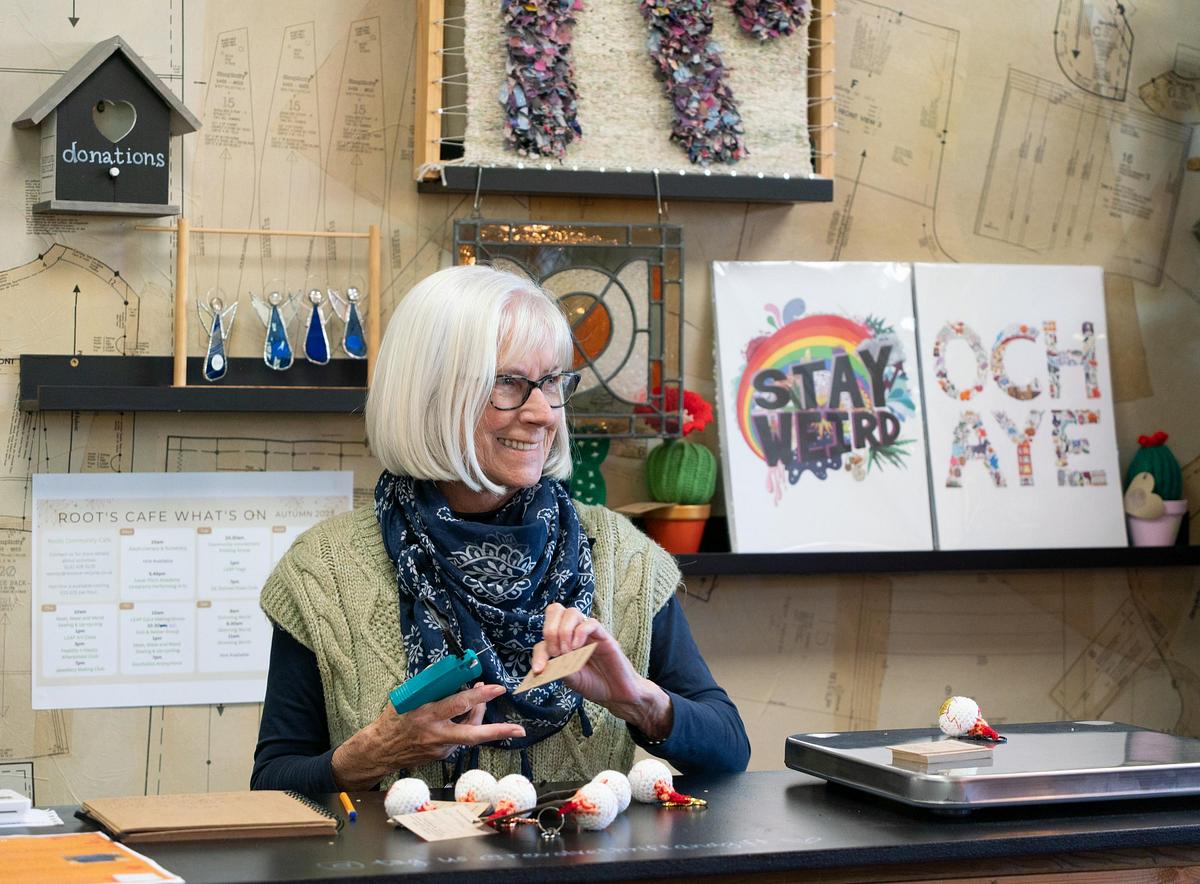‘It helped me focus my attention on where it meant the most’
“We are an organisation set up to reduce carbon emissions”, says Wendy Chambers, head of growth and sustainability at R:evolve Recycle.
The social business, operating since 2015, aims to reduce textile waste and educate the public about the devastating environmental cost of fast fashion.
Wendy and her team run two second-hand clothing and handmade gift shops in Rutherglen and Cambuslang, near Glasgow, which offer mending and repair as well as hall hire for local community groups.
The fashion industry is responsible for 8-10% of global emissions, mostly because of the sheer volume of clothes we buy in the Global North. Keeping clothes for longer and buying second-hand (so that fewer items need to be made in the first place) helps reduce this excessive carbon pollution.
“We already save a lot of CO2 from our everyday work,” she explains. “But obviously we want to minimise our impact as much as possible as well.”
Motivation and making a plan
Wendy had already taken a few courses for businesses about climate change but still felt uncertain about where to start. So, she joined Climate Springboard in March 2025, looking for changes she could implement quickly and easily, while focussing efforts on where it would make the biggest difference.
“I just wanted somebody to tell me a pathway, because we’re already so busy.”
To create real change, you need to make sure everybody's on board. Wendy Chambers
As part of the programme, Wendy was supported to create a Net Zero Action Plan for R:evolve Recycle. She explains that creating – and publishing – this plan made a big difference: They can now be held accountable, so are more likely to keep up momentum.
Setting yearly targets for the next decade also means she can focus on a few actions at a time. As Wendy puts it, it helped her to “not get tangled in the web of all the things I could be doing.”
📒 Read R:evolve Recycle’s Net Zero Action Plan
Easy wins
As planned, the team has started with the easiest and cheapest interventions to cut their emissions.
One of the most effective changes, says Wendy, was installing a Hive hub and smart heating system. In addition to providing detailed data on their energy consumption, they can use it to set an automatic heating schedule, so that no gas is wasted on heating empty rooms.
They also asked their plumber to create heating zones in the Cambuslang shop so that different floors can be heated at different times – ideal for the basement which quickly warms up on its own when it’s full of volunteers sorting through donations!
Other low-cost changes made include:
- draught proofing
- loft insulation at their Cambuslang shop (installed by hand)
- movement-activated lighting (known as PIRs)
- low energy LED bulbs
- water urns instead of kettles
- staff training
- clearer signage on recycling bins
The early results are encouraging.
Three months after installing loft insulation, they have saved 1,886 kilowatt-hours (kWh) of gas compared to the same time the year before (this coincided with a warm spell, which may have contributed to needing less heat). That’s as much energy as you would use heating a one-bedroom flat for 78 hours straight!
And seven months after installing PIRs, they have saved 239 kWh of electricity compared to the same time the year before.
Making it stick
Wendy notes that getting staff and customers involved in these efforts, rather than introducing top-down measures, has helped make the changes stick.
She says that she encourages her staff and volunteers to "have a good moan" related to the workplace generally and the sustainability of their operations. By listening carefully to what isn’t working and asking people to suggest their own solutions, she has found staff very willing to make changes to their daily routines.
“To create real change, you need to make sure everybody's on board.”

Top tips from R:evolve Recycle
- 💡 Don't be afraid to ask your colleagues what they think about sustainability at your organisation. They'll come up with good ideas and raise issues you might not have spotted.
- 📊 Make data collection as easy as possible. It’s easy to push it to the bottom of your to-do list, so try habit stacking. Make new tasks, like recording gas consumption figures, part of existing routines, like doing your finances.